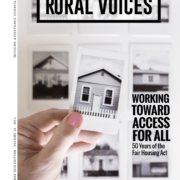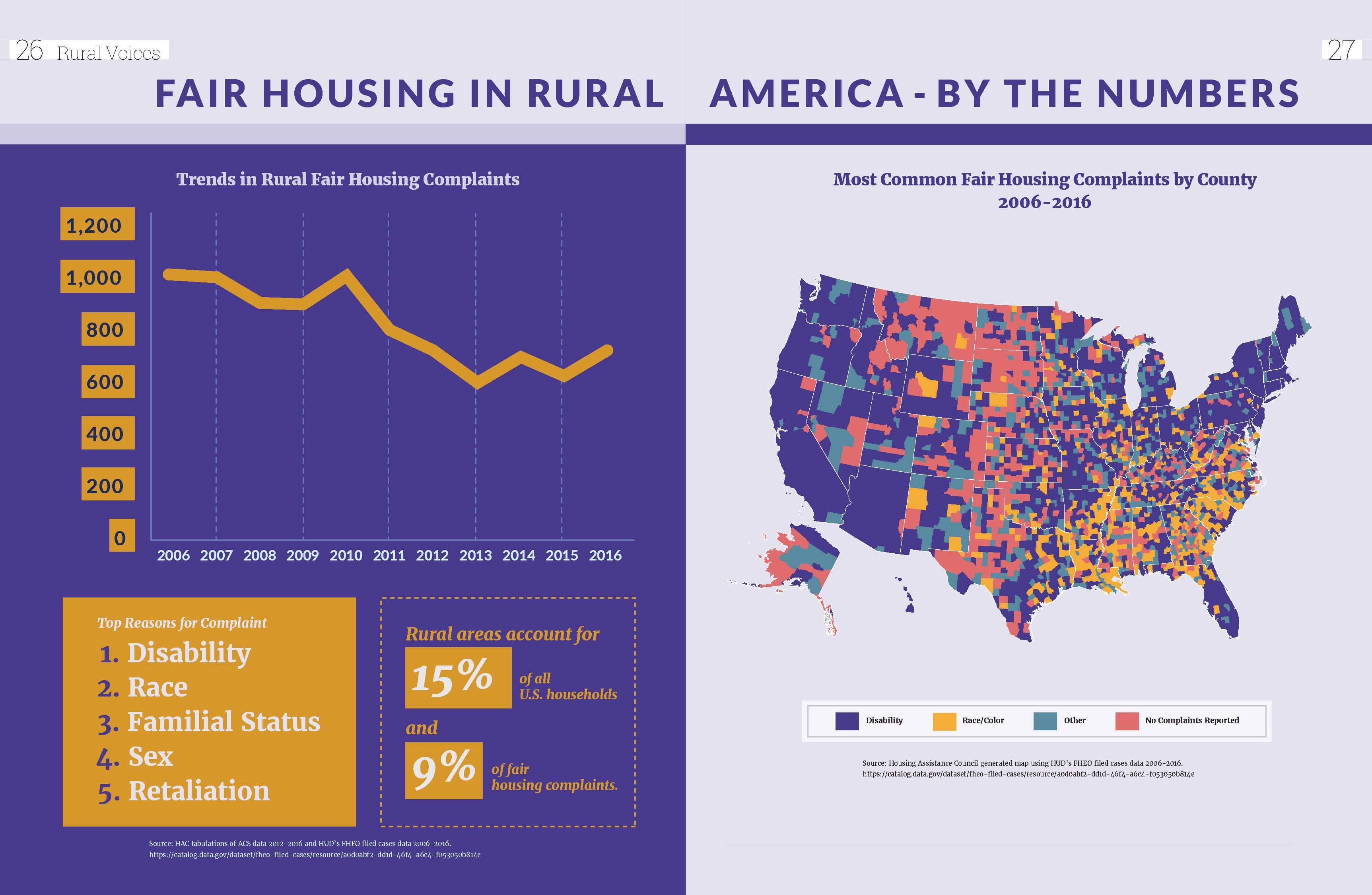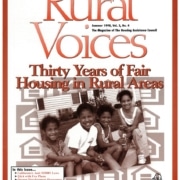HAC News Formats. pdf
November 11, 2018
Vol. 47, No. 23
EARLY BIRD RATE EXTENDED FOR 2018 HAC RURAL HOUSING CONFERENCE, NEW SPEAKERS ANNOUNCED • House committee leadership will change under Democratic majority • Congress to return for lame-duck session • November is National Native American Heritage Month • National Hunger and Homelessness Awareness Week is November 10-18 • HUD offers funds for public and private entities doing fair housing work. • Revisions proposed to Federal Home Loan Bank housing goals regulation • Labor Department proposes online ads for U.S. farmworkers • Online tool refined for rural mortgage eligibility • Creative placemaking webinar series announced • New HUD database lists fair housing organizations • Report describes use of state housing trust funds in rural areas • HUD report looks at who uses homebuyer education and housing counseling • New resource guide offered to help address rural opioid epidemic
HAC News Formats. pdf
November 11, 2018
Vol. 47, No. 23
EARLY BIRD RATE EXTENDED FOR 2018 HAC RURAL HOUSING CONFERENCE, NEW SPEAKERS ANNOUNCED.
By popular demand, early bird registration rates have been extended! Register now for the conference, to be held December 4-7 at the Capital Hilton in Washington, DC. Federal Reserve Chair Jerome Powell and Senator Catherine Cortez Masto (D-NV) are now confirmed as speakers, as is HUD Secretary Ben Carson.
House committee leadership will change under Democratic majority.
Control of House committees will shift to Democrats when the 116th Congress takes office in January. Rep. Maxine Waters (D-CA) is expected to become Chair of the House Financial Services Committee, which has jurisdiction over matters related to authorizing housing programs, including USDA’s rural housing programs. Important Appropriations Committee changes will be in the Agriculture and Transportation-HUD subcommittees, where Rep. Sanford Bishop (D-GA) and Rep. David Price (D-NC), respectively, are currently the top Democratic members. Rep. Collin Peterson (D-MN) is likely to Chair the House Agriculture Committee, with jurisdiction over the Farm Bill.
Congress to return for lame-duck session.
The 115th Congress will be back in session beginning November 13 and will need to finish appropriations for fiscal year 2019, which began October 1. USDA, HUD, and several other federal agencies are funded under a continuing resolution through December 7, so full-year funding or another short-term CR will be needed.
November is National Native American Heritage Month.
President Trump’s proclamation also recognizes November 23 as Native American Heritage Day.
National Hunger and Homelessness Awareness Week is November 10-18.
Participating groups around the country will hold educational, service, fundraising and advocacy events during the week, sponsored by the National Coalition for the Homeless and the National Student Campaign Against Hunger and Homelessness.
HUD offers funds for public and private entities doing fair housing work.
Fair Housing Initiatives Program grants are available from three programs, each with a December 19 application deadline: the Education and Outreach Initiative, the Fair Housing Organization Initiative, and the Private Enforcement Initiative. For more information, contact Myron Newry, HUD.
Revisions proposed to Federal Home Loan Bank housing goals regulation.
A proposed rule from the Federal Housing Finance Agency would replace four separate goals for single-family affordable housing with one, set a separate housing goal for small lenders, and make other changes. Comments are due January 31, 2019. For more information, contact Ted Wartell, FHFA, 202-649-3157.
Labor Department proposes online ads for U.S. farmworkers.
Before receiving permission to hire farmworkers from outside the U.S. with H-2A temporary visas, an employer must show it has attempted to recruit U.S. farmworkers. The Department of Labor is proposing to require employers to recruit through online advertisements instead of the newspaper ads that are currently required. Secretary of Agriculture Sonny Perdue described the change as “one way to modernize H-2A.” Comments are due December 10. For more information, contact William W. Thompson, II, DOL, 202-513-7350.
Online tool refined for rural mortgage eligibility.
USDA Rural Development’s website now allows potential borrowers to enter information online in order to make a preliminary determination of eligibility for the Section 502 direct mortgage program. Anyone can enter general household composition, monthly income, other debts and credit, estimated property taxes, hazard insurance and location, and receive a preliminary eligibility determination. Potential borrowers can submit applications for official USDA determinations regardless of their eligibility assessment results.
Creative placemaking webinar series announced.
The six monthly webinars will offer practical advice for meeting the challenges of collaborative creative placemaking work in all communities. The first webinar, on November 14, will feature a Native community leader, Julie Garreau, discussing her work with the Cheyenne River Youth Project in South Dakota. The series is offered by LISC, the National Endowment for the Arts, and the Kresge Foundation.
New HUD database lists fair housing organizations.
HUD has launched a new database of fair housing organizations, providing contact information for organizations that receive HUD funding to help ensure fair housing opportunities around the U.S.
Report describes use of state housing trust funds in rural areas.
In State Housing Trust Funds: A Rural Housing Lifeline, the Center for Community Change explains how states are using housing trust funds to meet the unique needs of their rural communities. These funds are flexible in addressing a wide range of housing needs and are being used for homeownership, rental housing, and homeless prevention.
HUD report looks at who uses homebuyer education and housing counseling.
A study of low-, moderate- and middle-income prospective first-time homebuyers in 28 metro areas found that 55% of those who were offered one-on-one or remote counseling used it, and about one-third of them completed their curriculum. Who Participates in Homebuyer Education and Counseling Services and Why? reports that both initiation and completion rates were much lower for in-person services rather than remote services. Participation did not vary by race, ethnicity, age, marital status, or household size, but women and people with college educations were more likely to participate than others. Later research will consider the effectiveness of education and counseling, and whether in-person or remote services are more effective.
New resource guide offered to help address rural opioid epidemic.
USDA and the White House Office of National Drug Control Policy have released a Rural Resource Guide to Help Communities Address Substance Use Disorder and Opioid Misuse, a listing of federal programs intended to serve as a one-stop-shop to support local groups attempting to address the opioid crisis. The Rural Resource Guide is the second tool announced in USDA’s opioid Community Toolbox. The first was a Community Assessment Tool, an interactive data map.
HAC offers Section 502 packaging training in December.
This three-day advanced course trains experienced participants to assist potential borrowers and work with RD staff, other nonprofits, and regional intermediaries to deliver successful Section 502 loan packages. The training will be held December 5-7 in Washington, DC (simultaneously with HAC’s conference). For more information, contact HAC staff , 404-892-4824.
Need capital for your affordable housing project?
HAC’s loan funds provide low interest rate loans to support single- and multifamily affordable housing projects for low-income rural residents throughout the U.S. and territories. Capital is available for all types of affordable and mixed-income housing projects, including preservation, farmworker, senior and veteran housing. HAC loan funds can be used for pre-development, site acquisition, site development and construction/rehabilitation. Contact HAC’s loan fund staff at hacloanfund@ruralhome.org, 202-842-8600.
Please note: HAC is not able to offer loans to individuals or families. Borrowers must be nonprofit or for-profit organizations or government entities (including tribes).






